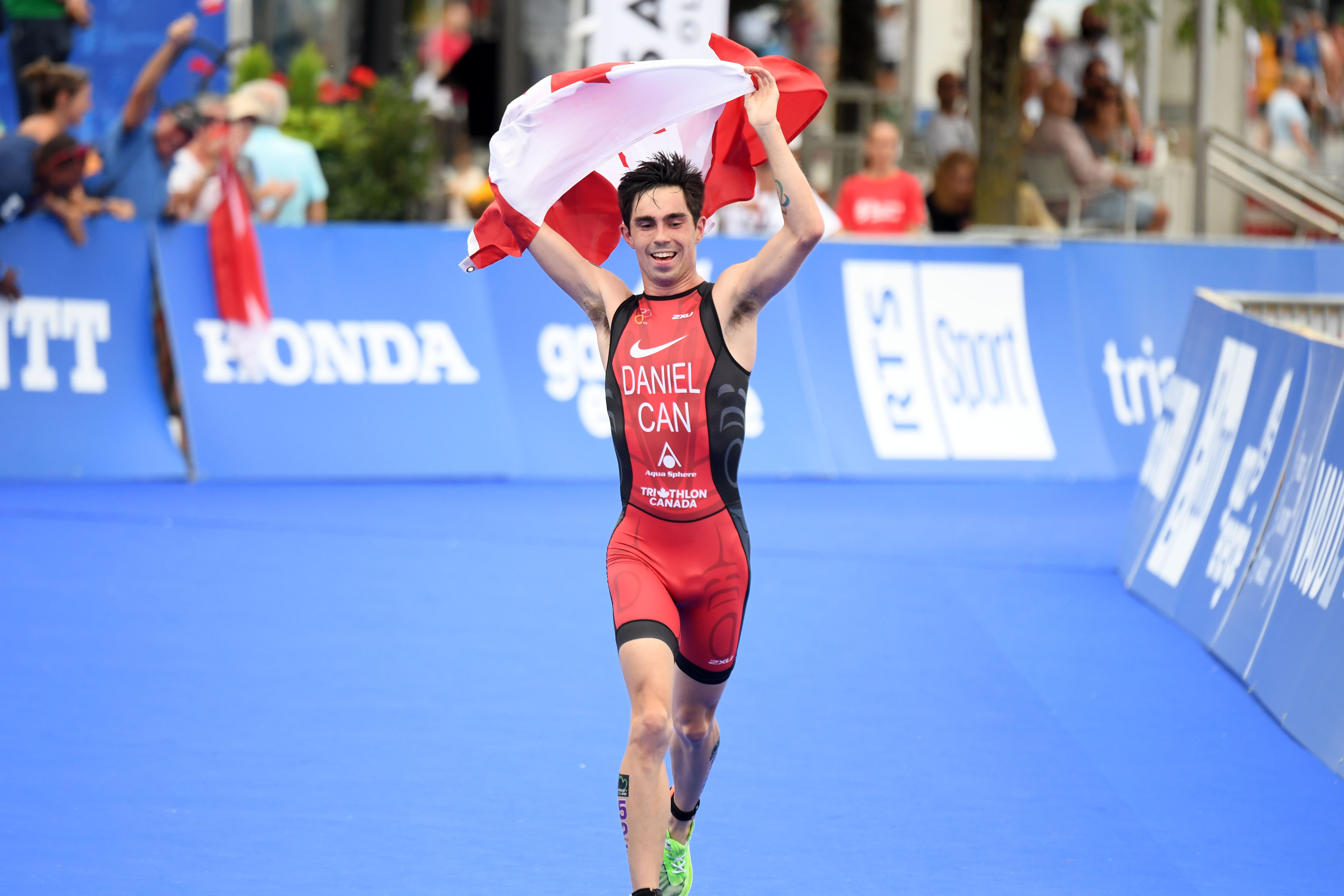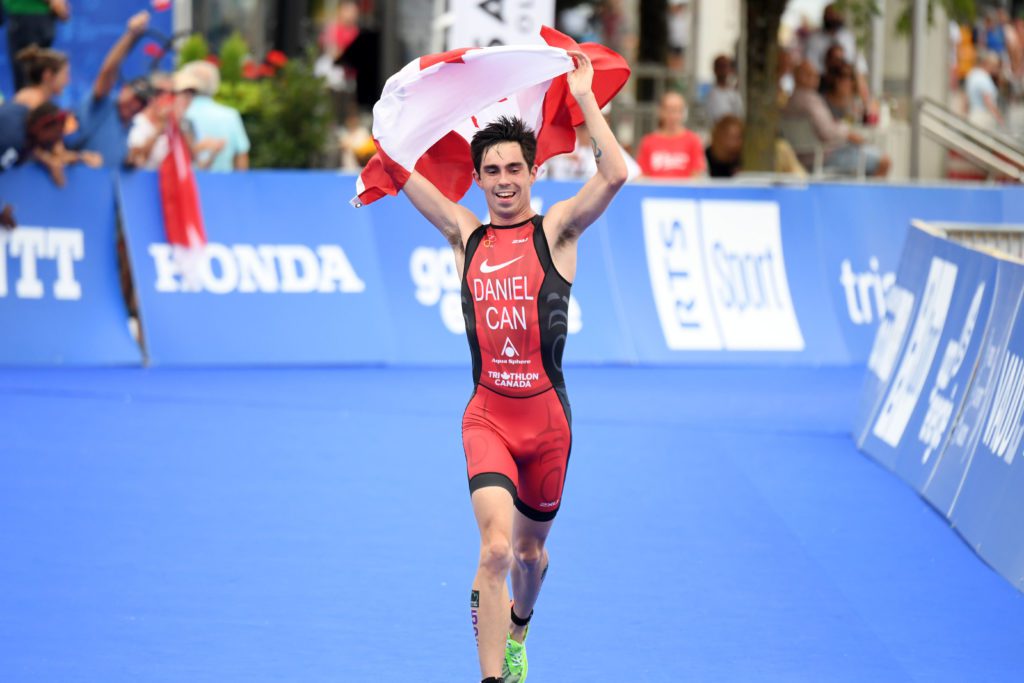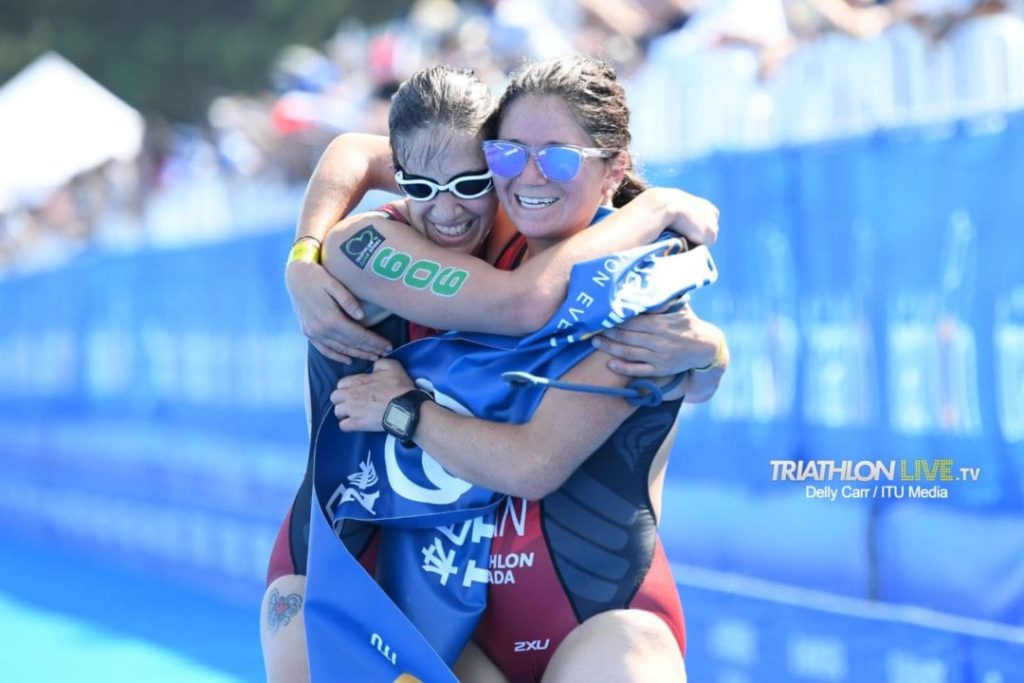Daniel and Tuomela are our Paratriathletes of the Year
Stefan Daniel had an unbeaten season and took his fourth world championship, while Jessica Tuomela and her guide Marianne Hogan took bronze in Lausanne - all were named Triathlon Canada's Elite Triathletes of the Year.

It was a medal-filled year for both Stefan Daniel and Jessica Tuomela in 2019.

Stefan Daniel continues his winning ways through 2019
When he looks back, 2016 “was a pretty stressful year.” If Stefan Daniel thought that year was stressful, though, one would think that 2020 is going to be a pressure cooker. You don’t win a silver medal at the Paralympics (which he did during that “stressful” 2016) and win four straight Paratriathlon world titles unless you can handle pressure, and Daniel seems to be taking care of that just fine.
Daniel remains focussed on his own performances rather than worrying about his competition and keeps raising the bar for a para athlete. This year, after returning from Lausanne, Daniel helped his University of Calgary Dinos cross country team successfully defend their national title, even winning the Canadian Western Championships. We learned after his gutsy performance at the national championships that Daniel did the race with a stress fracture.
We reported on that performance just before Christmas.
It should come as no surprise that Daniel is as good a runner as he is – he started swimming when he was eight, but also started running road races with his mother about the same time. In 2013, when triathlon was added to the 2016 Paralympic Games in Rio, he jumped into triathlon.
Staying sharp through cross-country nationals is no easy feat – Daniel started his season with a win at the CAMTRI Paratriathlon American Championships in March, took the ITU World Paratriathlon Series wins in Yokohama, Japan and Montreal, then won the swim-cancelled Tokyo Test event, then rounded out the year where with his fourth world title in Lausanne.
Related: Daniel takes fourth world title
Daniel will put his business studies from the University of Calgary on hold through the winter to prepare for Tokyo, a race which obviously suits him thanks to his wins over both George Peasgood and Martin Schulz this year, the two men likely to be his main competition in Tokyo.
After being forced to take some time off because of the stress fracture, Daniel is back training as he prepares for possibly the biggest year of his life. That will include a full winter of training that includes a camp down in Tucson in February where he’ll “ride outside with the guys” and get ready for his first race of the season in Sarasota in March.
His incredible season made him an easy choice as our Paratriathete of the Year and Triathlon Canada’s Elite Triathlete of the Year. He also earned honourable mention status for our Triahtlete of the Year award, too, won by Tyler Mislawchuk.

Related: Daniel takes fourth world title while Tuomela claims bronze in Lausanne
‘T’ is for Tough, Triathlon & Tuomela
by Helen Powers
Triathletes are tough folk who train hard and push themselves to do better. And then there’s Jessica Tuomela. Blind since the age of three, she began competitive swimming at 12 and earned several medals in the Paralympics. After a long break from athletics, Tuomela has recently transitioned to paratriathlon and she’s standing proudly on podiums again.
Growing up blind in Sault Ste. Marie, Tuomela’s exposure to sports was rather limited, in part, because people assumed she would be hurt. At the age of 12 she moved to a school for the blind in Brantford, Ontario where she conquered a fear of deep water, learned to swim and competed with the school’s swim team.
In 2000, she advanced to the national swim team and won a silver medal at the Paralympic Summer Games in Australia. At the 2004 games in Greece, she set five new Canadian records and, in 2006 at the Belgian Paralympic Championships, Tuomela won two golds and a silver.
2008 was her last year of competitive swimming.
“It was always my plan to leave after the Beijing Olympics,” she says. While she trained for Beijing at the University of Waterloo, there were triathletes at the pool and she thought that was cool, to do three sports. Little did she know what would be in her own future.
“I tried to be a non-athlete during my break, but it didn’t go so well for me,” she says. Although her break was busy, she wasn’t super active and had to work at getting back in shape. “In 2015, I forced myself into running to get a bit of fitness to help with the long-term goals,” she says. “I went from couch to triathlon in a short amount of time.”
Her first triathlon, in June 2016, was the ITU Nationals in Ottawa. Carolyn Murray, head coach of Paratriathlon for Team Canada, was there to check her out. Six months later, Tuomela attended a talent identification camp and talked to Murray again.
“I asked her if, as an older athlete, I should pursue competitive triathlon,” explains Tuomela, “and she said yes.”
At this point, Tuomela was 33 years old.
Tuomela soon moved to Ottawa to work with a development coach and, in July 2017, she moved again to Victoria to train with the national team. In 2018, at the ITU World Paratriathlon Series event in Edmonton, Tuomela was the first fully blind athlete to win gold in an event on the circuit, according to the Canadian Paralympic Committee.
As Tuomela gets faster, finding a guide gets more difficult, but she and Marianne Hogan are a dynamic duo.
“We were paired in May (2019) and we did our first race together three weeks later. From a technical standpoint, the tandem bike is the hardest to learn,” she says. “The swim is the hardest part of races because you can’t talk to each other.”
One of her favourite courses last year was Montreal, where they took third place.
“It was so much fun being on the Formula One racetrack and we got up to crazy speeds on the bike.”
A few weeks later, in Magog, they took second and then two firsts, at the Paratriathlon National Championships and the Tokyo ITU Paratriathlon World Cup.
In Tokyo, the swim was cancelled and the triathlon turned into a duathlon. Tuomela was especially surprised about this finish: “We won! Which was shocking. Running is not what I would call my strong point.” Tuomela’s flexible feet make it difficult to run so her training is very intentional and the volume can’t be large.
She was plenty strong at the ITU World Triathlon Grand Final in Switzerland last fall and took home a bronze medal. It was a tough course, lots of hills and a technical run with super-tight turns.
“When you can’t see those, it’s tough,” she says”I actually fell off the curb and landed on my butt.”
“Everyone had been cheering and then they all went quiet when I fell. And I was thinking, ‘Stop looking! This is paratriathlon and we fall over all the time!”’
Tuomela’s next goal is qualifying for the 2020 Paralympics and she’s ramping up the training with just one whole day off, twice a month.
“I’m trying to build that solid platform so I have the structure to do what I need to do,” she explains.
A few years ago, she worked while she trained, but it wasn’t satisfactory.
“Nothing was quality, I was just getting it done,” says Tuomela. “I don’t like that feeling, I want to do the best I can.”
“Paratriathlon is complicated and you could write a book about it easily,” explains Tuomela, “There’s always something new, it never gets stale and it’s pretty cool. I love it.”
